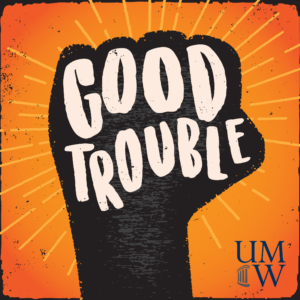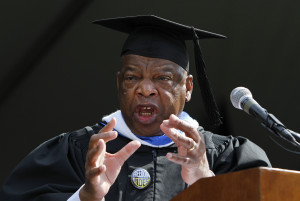Eliza Vegas marched in her first protest this summer for Black Lives Matter. The University of Mary Washington is inspiring her to do more.

“An overwhelming sense of home and community brought me here,” said Vegas, a Mary Washington first-year student who learned of the University’s long history of student activism when she listened to a new podcast on the topic. “Now I have a deeper appreciation for my new school.”
Since 2015, incoming students have read and discussed written works with the UMW community as part of the Common Experience. This year, instead of a book, they’re exploring four timely and topical podcasts about COVID-19 and civil rights, connecting events of the past to the present. They’re also listening to “Good Trouble: UMW,” a new podcast named for the late Congressman John Lewis’ lifelong philosophy, which he shared in his 2011 Commencement address at Mary Washington.
The 18-episode podcast series chronicles Mary Washington student activism throughout the decades, relating back to Lewis’ directive to get in “good trouble, necessary trouble.”
In one of the podcasts, an interview with NPR earlier this year, Lewis described his first meeting with Dr. Martin Luther King Jr. Lewis had just graduated from high school when he penned a letter pledging his support for civil rights. In response, Dr. King sent the teen a round-trip bus ticket to meet him.
“I was so scared,” Lewis said about this fateful encounter that launched his lifetime commitment to activism and justice. “I didn’t know what to say or what to do.”

We think of Lewis as a man of “so much conviction, power and strength,” said First-Year Experience Director April Wynn. But Lewis was also nervous when he started out. “We want our students to see themselves in him and know they have the capacity for great things, even now during a time of turmoil and unrest.”
Civility and political action was originally this year’s chosen theme, Wynn added. That was because of the upcoming presidential election and UMW’s Farmer Legacy 2020, celebrating the centennial birth of civil rights icon and late Mary Washington history professor Dr. James L. Farmer Jr. That focus expanded and became even more relevant, she said, once COVID-19 struck and widespread protests against systemic racism began in cities across the globe, including Fredericksburg. UMW faculty and staff had long discussed introducing podcasts into the Common Experience, she said, and now seemed the perfect time to do so.
“Podcasts give us a sense of intimacy with other people during the pandemic,” said Associate Professor of English Colin Rafferty. In addition to producing “Good Trouble: UMW,” he’s teaching a First-Year Seminar in which students will create their own podcasts. “It’s one thing to read someone’s words, but it’s much more powerful to have their voice in your ear, telling you their stories.”
Interviews with Farmer and Lewis comprise three of the Common Experience podcasts, while the fourth compares COVID-19 with the 1918 flu. Students have also engaged in weekly discussions on Canvas and uploaded original photos, artwork, prose and poems illustrating how the pandemic and protests have impacted their own lives.

Freshman Owen Chong said he was moved when he heard in a 1985 NPR interview Farmer describing in his booming baritone the Freedom Riders’ arrest in Jackson, Mississippi. “His courage, perseverance and humor showed me the lengths one may have to go to for change.”
The first two episodes of the “Good Trouble” podcast focus on the Black Lives Matter movement, which drove UMW students into the streets of Fredericksburg to protest. Student Government President Kyree Ford, James Farmer Multicultural Center Assistant Director Chris Williams and Brianna “Breezy” Reaves, president of UMW’s NAACP chapter, describe what it was like to stand up against racial injustice and get teargassed by the police.
“I think that when you’re young,” Reaves explains in the first episode, “you don’t see a reason to be quiet, to wait or to be patient.”
Other installments feature students, faculty, staff and alumni, providing first-hand accounts of previous Mary Washington movements: the Living Wage campaign, “Save the Name” protests, Occupy UMW, LGBTQ+ activism and Feminists United. Civic engagement on campus will be discussed, as well as Students Helping Honduras, a nonprofit that started in a UMW residence hall.


Galvanized by the podcasts, first-year Tabitha Robinson says she’s now ready to get into some “good trouble” of her own.
“If I don’t speak out, who will?” she said. “Change occurs in a society from the inside out, and I want to do my part to inspire change for the better.”





